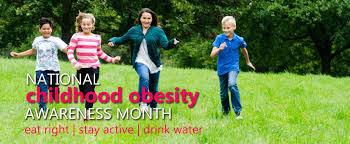September is Childhood Obesity Awareness Month
September is here and that means our kids are back to school. Mornings are more hectic, getting ourselves out the door and to school and work on time. Evenings are often filled with homework, moving to and from sports or after school care, in addition to our regular life chores. While it can be nice to be back in our normal routine, for most of us it is a busy and often stressful life! Finding time to exercise, relax and have fun can be challenging and sometimes these essentials to our health and happiness fall by the wayside.
The same is true for eating healthy. The time and energy required to shop and prepare fresh food can be costly in more ways than one! Sometimes it is easier to throw in a frozen pizza or grab a fast food hamburger and let our tired body chill out in front of the television. At the same time, those routines we form now can often stick for life and influence how our children think about health and the choices they make as they become adults. This time is an opportunity for us to challenge ourselves to make new habits that support our overall health and happiness. I am not saying no burgers, just that wherever we are in our eating and exercise habits, we can always make improvements that will impact our health, both physical and mental.
September is National Childhood Obesity Awareness Month. Statistics say that nationwide 12.7 million children and adolescents are obese or overweight. Here in Mendocino County, 47.6% of fifth graders are overweight or obese and only 58.1% of students are physically fit. What does that mean? Well, children who are overweight in their adolescent years have a 70% chance of becoming adults who are overweight or obese. This puts them at higher risk of a range of other health issues including cardiovascular disease, high blood pressure and type 2 diabetes.
So, what can we do? Obesity is a complicated issue and has more factors than we normally think about; affordability of healthy food, stress management, lack of adequate sleep, and even traumatic events can affect our ability to achieve and maintain a healthy weight. But we also know that diet and exercise play a huge roll in our ability to handle stress, sleep well and feel good.
New habits are not always easy to create. It usually will take 28-40 days to get a new habit to be automatic and getting support will make that process a lot easier. Here are some suggestions to think about:
- Walk your child to school when possible or join a walking school bus
- Take ten minutes before dinner and throw a ball, walk around the block, or dance to your favorite song with your child
- If available, enroll your child in sports, martial arts, or a dance class. Cities often have scholarships available to help with cost
- Try and add a new vegetable to your family’s diet once a month. If you find new things you like, do it once a week!
- Try fun recipes to flavor water instead of drinking sodas. For example: put a few mashed strawberries and a few mint leaves in a gallon of water. Sugar sweetened beverages are a big source of calories that we sometimes forget about. Less it better.
Being healthy can sometimes feel like a full-time job on its own, but we are the keepers of our own health and as parents we are also the keepers of our children’s health. Let’s support each other to create habits that keep us all healthy and happy.
Need inspiration? Try this link to check out the list of 100 Fun Activities for Family Fitness, or check out these budget friendly recipes at http://www.eatingwell.com/recipes/17918/mealtimes/dinner/budget/. If you want to join the larger community, consider having your family join the Walktober Challenge coming up next month (see our Walktober page for more details later this month http://www.healthymendocino.org/tiles/index/display?alias=Walktober)!
###
Julie Fetherston, M.S. is the Inland Action Team Coordinator for Healthy Mendocino. Julie facilitates opportunities for individuals, organizations to engage in creating new communities through information, communication and connection. Her academic background is in Psychology and Ecology which informs her wholistic perspective. She has twenty years of experience in strategic analysis and program development.

